Trading quotes from the best traders
Alexander Elder
“Show me a trader with good records and I’ll show you a good trader.”
– Dr. Alexander Elder, author of several books including Come into my trading room and Trading for a living and partner in SpikeTrade.
Warren Buffett
“Risk comes from not knowing what you’re doing.”
– Warren Buffett, 4th richest man in the world
Peter Lynch
“You get recessions, you have stock market declines. If you don’t understand that’s going to happen, then you’re not ready, you won’t do well in the markets.”
– Peter Lynch, Mutual fund manager
Jesse Livermore
“Speculators without a plan are like a general without a strategy, and therefore without an actionable battle plan. Speculators without a single clear plan can only act and react, act and react, to the slings and arrows of stock market misfortune, until they are defeated.”
and
“Sell down to your sleeping level” (have an adequate amount of risk in your portfolio so you can sleep well at night)
– Jesse Livermore, author of Reminiscences of a Stock Operator
Larry Hite
“If you diversify, control your risk, and go with the trend, it just has to work.”
– Larry Hite, famous hedge fund manager
Brett N. Steenbarger
“The Journal is a business plan. The right plan, executed faithfully, can be the difference between success and failure in any endeavor.”
– Brett N. Steenbarger, Ph.D. – author of The Psychology of Trading: Tools and Techniques for Minding the Markets , Head of Trader Development at Tudor Investments and contributor at Forbes.
Quotes from famous traders
Do you also admire some of these famous traders?
We’ve done our best to integrate their philsophies into our tools in Tradebench. Want to see for yourself and use the tools cost free? Go ahead and sign up to get started.
We look forward to serving you.

World famous investor Warren Buffett
Some more great trading quotes
Charlie Munger
“Spend each day trying to be a little wiser than you were when you woke up.”
– Charlie Munger, American billionaire investor and vice chairman of Berkshire Hathaway, the conglomerate controlled by Warren Buffett.
Paul Samuelson
“Investing should be more like watching paint dry or watching grass grow. If you want excitement, take $800 and go to Las Vegas!”
– Paul Samuelson, Nobel prize winning American economist
Robert Olstein
“The desire to perform all the time is usually a barrier to performing over time.”
– Robert A. Olstein is the Chairman and Chief Investment Officer of The Olstein Funds.
Jack D. Schwager
“Think about the psychological process involved. At the beginning, the trader fell for the lure of making easy money. When the stock declined to $18, he felt a little anxious. When it fell to $17, he felt the onset of panic. When the stock slid to $15, it was pure panic. When he finally got out, he felt a sense of relief – which is somewhat ironic since he had just lost 70 percent of his money. There’s nothing logical about this process. It’s all an emotional pitfall. Planning where to get out before putting on the trade is a means of enforcing emotional discipline.”
– Jack D. Schwager, author of The Market Wizards series books
Stanley Druckenmiller
“I never use valuation to time the market. I use liquidity considerations and technical analysis for timing. Valuation only tells me how far the market can go once a catalyst enters the picture to change the market direction. The catalyst is liquidity, and hopefully my technical analysis will pick it up.”
– Stanley Druckenmiller, legendary investor and hedge fund manager of Duquesne Capital
William J. O’Neil
“The whole secret to winning and losing in the stock market is to lose the least amount possible when you’re not right.”
– William J. O’Neil, author of several books including How to Make Money in Stocks, inventor of CANSLIM and founder of the national financial newspaper Investor’s Business Daily, which competes with The Wall Street Journal.
Warren Buffett (quote #2)
“The trick in investing is just to sit there and watch pitch after pitch go by and wait for the one right in your sweet spot.”
– Warren Buffett, 4th richest man in the world
Brian Shannon
“You need a well-thought-out plan which anticipates all potential scenarios to keep you from making impulsive and emotional decisions during market hours. You are being bombarded constantly with new information from peers, television, price action, websites, etc. Trading stocks is a business, and if you want your business to thrive you must have a plan which you execute flawlessly.”
– Brian Shannon, from his book Technical Analysis Using Multiple Timeframes
Benjamin Graham
‘‘Before you invest, you must ensure that you have realistically assessed your probability of being right and how you will react to the consequences of being wrong’’.
Benjamin Graham – The Intelligent Investor
Richard D. Wyckoff
“You cannot be successful at trading any more than you can be at mining, manufacturing, doctoring or anything else, unless you are trained for it. And by “training” I don’t mean an occasional dab.”
“We succeed in proportion to the amount of energy and enterprise we use in going after results. Success is not for the man who is willing to sit down and wait for something to fall into his lap.”
– Richard D. Wyckoff
John Murphy
“Always be a student and keep learning.”
– John Murphy, author of The Visual Investor: How to Spot Market Trends as well as other books and Chief Technical Analyst at StockCharts.com
Sign up here
Cost free. No paid plans!
Join over 70,000 other traders and see what a difference TradeBench will make in your trading!
* To use our tools and all features as much as you’d like for free, all you have to do is click one or two sponsor/partner links per month. We’ll either show the link(s) when you log in and/or send an e-mail (maximum 1 per month) with the link(s).